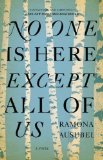Summary | Excerpt | Reading Guide | Reviews | Beyond the book | Read-Alikes | Genres & Themes | Author Bio

The first part of Slouka's second
novel tells of the narrator's childhood growing up
in post-World War II New York, the son of Antonín
and Ivana Sedlák, Czech immigrants whose marriage is
disintegrating under the weight of Ivana's love for
the man she lost during the war.
In the second part of The Visible World it is
1986, two years after the narrator's mother has
killed herself, and the narrator has moved to Prague
in the hope of finding out what happened between his
parents, and why his mother was unable to put behind
herself events that took place forty years ago ("My
mother erased herself so thoroughly that for a long
time, I couldn't find her anywhere"); but all he
finds are hints of fact and dead ends.
Many of us who find ourselves with reason to wonder
about our ancestors fill the gaps in our knowledge
with imaginings of what their lives were like (which
is surely a great part of the attraction of movies
and books set in the time period of our parents and
grandparents). This blend of fact and fiction form
the family myths that connect us to generations
past. In the third and longest part of The
Visible World the narrator takes the small
nuggets of information that he has discovered about
his parents' wartime experience and writes a novella
that imagines the time and place when his parent's
personal lives collided with real historical events
involving the assassination of high-ranking Nazi
official Reinhard Heydrich. In so
doing he creates a tangible whole that leaves the
reader well satisfied and, by extrapolation, forms a
foundation of "truth" about his parents on which he
can build the rest of his life.
Mark Slouka is the child of Czech immigrants
and draws on his personal experience and the
inevitable intrusions of the past on the present. He
is the author of the novel God's Fool (2002),
named a Best Book of the Year by the San Francisco
Chronicle, which tells the story of
Chang and Eng,
the original Siamese twins who toured with P.T.
Barnum's circus in the 1830s before settling down to
marry two different women and father 22 children. He
is also the author of the short story collection
Lost Lake, a New York Times Notable Book in
1998; and the nonfiction work War of the Worlds:
Cyberspace and the High-Tech Assault on Reality
(1995). Three of his essays have been selected for
inclusion in The Best American Essays, and his short
story "The Woodcarvers Tale" won the National
Magazine Award for fiction. He is a contributing
editor at Harper's Magazine, and is currently the
director for the writing program at the University
of Chicago.
*(From sidebar) All the male inhabitants of Lidice were shot, the women were sent to Ravensbruck concentration camp and the children (other than a few that were sent to be re-educated in Aryan households) were poisoned by exhaust gas in specially adapted vehicles in the Nazi extermination camp at Chelmno in Poland. Then the village was flattened until no buildings remained. The Nazi attempt to wipe the village off the face of the earth failed. Several villages around the world took the name Lidice in memory, and many girls born at the time were named Lidice. 340 Lidice citizens were murdered, but after the war 143 women returned home to a new village that was built close by and, after a two-year search, 17 children were restored to their mothers.
![]() This review was originally published in The BookBrowse Review in June 2007, and has been updated for the
April 2008 edition.
Click here to go to this issue.
This review was originally published in The BookBrowse Review in June 2007, and has been updated for the
April 2008 edition.
Click here to go to this issue.

If you liked The Visible World, try these:

No One is Here Except All of Us
by Ramona Ausubel
Published 2013
A beguiling, imaginative, inspiring story about the bigness of being alive as an individual, as a member of a tribe, and as a participant in history, exploring how we use storytelling to survive and shape our own truths.

by Michael Wallner
Published 2008
Set in 1943, April In Paris, by first time German novelist Wallner, is the dramatic story of an impossible love between a German soldier and a French Resistance fighter in occupied Paris.
Your guide toexceptional books
BookBrowse seeks out and recommends the best in contemporary fiction and nonfiction—books that not only engage and entertain but also deepen our understanding of ourselves and the world around us.